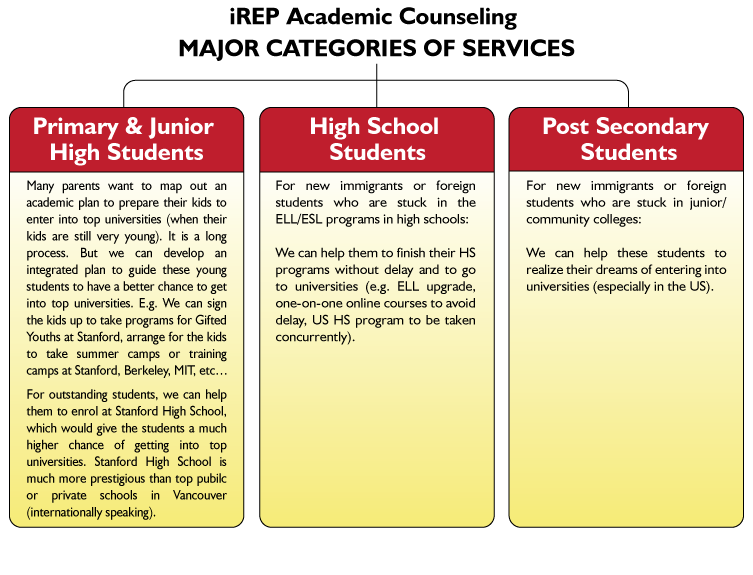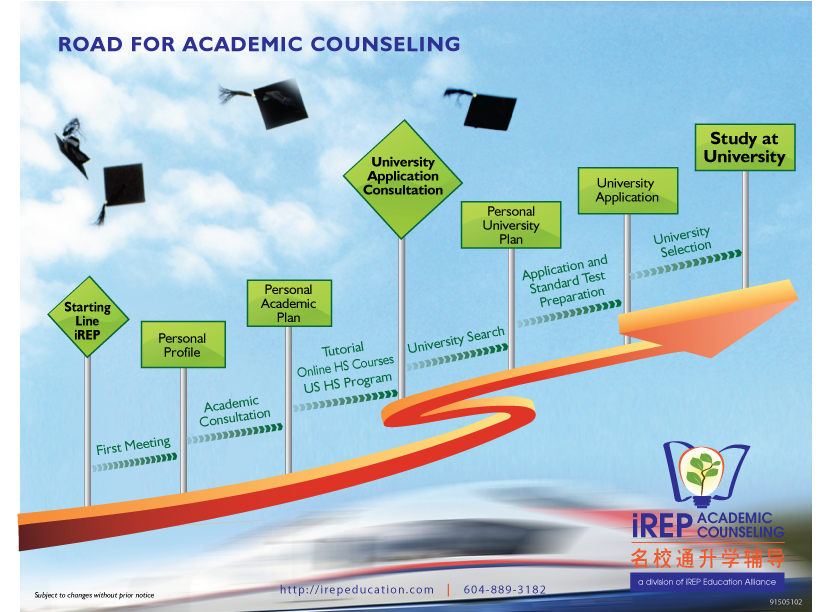Are you being held back by your ESL progress in school?
Are you lost in what courses to take to prepare for university studies?
Not sure how to go about exploring university options?
Any ambition to apply for high-ranked universities in the US?
iREP Academic Counseling can help!
THE PROCESS:
iREP DIFFERENCE
What are the differences between iREP Academic Counselling and a typical Education Agency?
We sell solutions not products. Most education agencies have agency agreements with certain colleges or schools. Education agents get commissions by sending students to partner colleges or schools. They may not charge counseling fees to the students; however, they usually take no heed that if the recommended schools are suitable for the applicants. iRep Academic Counselling adheres to a student centered principle. We will meet with the student (and the parents) to formally develop a student profile and recommend well-matched schools based on their family background, academic achievement, learning interest, employment orientation, etc…
A MAJOR CATEGORIES OF SERVICES

THE STEPS

ACADEMIC CONSULTATION
(a) Personal Consultation (Personal Profile):
An IREP Counselor will meet with the student (and the parents) to formally develop a student profile based on
a) |
the background. |
b) |
the educational history and current academic standing. |
c) |
any extracurricular activities. |
d) |
any special talents or interests. |
e) |
any “standardized” tests taken. |
f) |
the aspiration and goals of the student and the parents. |
g) |
the education plan (if any). |
h) |
the financial standing, and |
i) |
any other relevant factors. |
This session is about 1.5 to 2.0 hours.
The student is expected to submit any relevant documentations re the above.
The Personal Consultation will culminate in a personal statement (the “Personal Profile”) to be signed off by the student/parents and iREP Academic Counseling. The Personal Profile will form the basis for future academic counseling and strategic plan development.
(b) Academic Guidance (Personal Academic Plan):
Based on the Personal Profile, a personal plan for academic guidance (the “Personal Academic Plan”) will be developed by iREP Academic Counseling. The Personal Academic Plan is a road map to develop the student academically, socially and extracurricularly, covering the following:
a) |
Advising on course selections to ensure the most relevance. |
b) |
Solving any academic problems (thru supplemental work such as tutoring, etc…). Our methodology is: |
| Power Teaching on core subjects to make sure that the student is one-level higher than his/her class. | |
| Target Teaching on provincial examinations, standardized tests, and/or for specific purposes (such as US HS courses). | |
c) |
Exploring the student’s relevant interests. |
d) |
Identifying and recommending extra-curricular activities and summer activities that are in line with the student’s abilities and interest as well as in support of his/her future goals. |
e) |
Learning how to make an impact in the school and local community. |
f) |
Understanding the US and/or Canadian educational system. |
g) |
Learning to assess universities and colleges. |
h) |
Understanding the standardized tests. |
i) |
Setting up the schedule for all recommended standardized tests. |
j) |
Regularly monitoring the student’s progress in accordance with the plan. |
k) |
Regular review and fine-tuning of the student’s goals and standings, which may result in updating the Personal Academic Plan. |
l) |
Recommend remedial work to make sure that the student is not behind. |
University Application Consultation
(a) University Search (Personal University Plan):
a) |
Develop a preliminary list of universities that would meet the student’s situation (including how the ranking should be interpreted). Generally, we would recommend 3 levels of universities: (1) Top schools that would be ideal to get into, (2) Universitie s into which the student would most likely be admitted, and (3) Backup universitie s to ensure that the student can go on to study at a recognized institution. The universities will be chosen based on their programs in areas of student interest and ranking. |
b) |
Finalize the list (up to 10 institutions) with the student and the parents, which will culminate in a personal plan for university applications (the “Personal University Plan”), which will be periodically reviewed and possibly revised in case of any change of the situation. |
c) |
Set up a schedule for applications (based on early admission and other factors). |
d) |
Plan and prepare for university visits (if so requested by the student or the parents). |
e) |
Manage communications with university representatives (whenever appropriate). |
(b) University Application Preparation:
a) |
Map out a schedule to make sure that the student completes the applications on time and properly (including any Common Application and any individual supplements, and submission of transcripts and test results). |
b) |
Advise student how to present the applications, academic performance and any extracurricular activities in the best light. |
c) |
Advise on finding the most appropriate teachers or appropriate people for Letters of Recommendation. |
d) |
Advise and edit personal statements and/or essays that are required of the student. |
e) |
Help prepare for university interviews (if so required). |
(c) University Selection:
a) |
Evaluate offers of acceptance to help the student select the best institutions for their purposes. |
b) |
Assist the student in handling any unusual issues such as “waitlisted” or “deferred” applications. |

